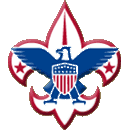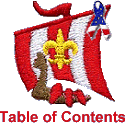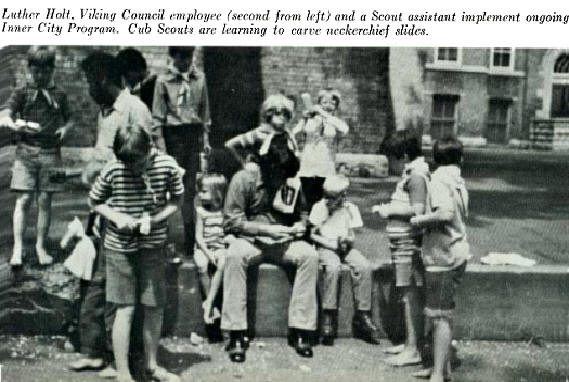
|
||
|
|
Scouting History in the Viking Council 1910-1976
|
|
Cover 1 2 3 4 5 6 7 8 9 10 |
|
|
word: "THANKS" on the Minneapolis Parade Stadium field to show their gratefulness to the citizens of Hennepin County for their support of the United Fund Program. Jim Whittaker, the first American to scale the 29,028-foot-high Mt. Everest, was the guest speaker at the 1964 annual luncheon honoring Eagle Scouts. Over 200 young men who received their Eagle Award in the period from 1964-1965 were on hand. The spring of 1965 saw hundreds of Scouts turn out to help evacuate homes along the Rum and the Mississippi Rivers in Anoka during the spring floods. The Viking Council acquired 930 acres near Annandale in 1966 as the site of a new short-term campsite for weekend events. The camp was purchased from under the estate of George C. Crosby. Scout membership that year was 27,000. The 12th World Jamboree was held in 1967 at Farragut State Park in Idaho and 30 Boy Scouts from Hennepin County took part under the leadership of Scoutmaster Herman Borg of Bloomington, Bill Johnson of Coon Rapids, and Igors E. Bruvelis of Minneapolis. Close to 15,000 Scouts from 100 nations took part in this International event. |
In the spring of 1969 a unique event took place in Eden Prairie - a Bake-off to end all Bake-offs as 500 Scouts prepared entries using charcoal and reflector ovens. Such items as pizza, bread, cakes, pies and much more were prepared outdoors. Judges had a difficult time picking winners at that event. Scouts were honored for 45 years of continuous ushering service at the 1969 University of Minnesota Football games. This service project started before Memorial Stadium was constructed and continues in the Metrodome with several hundred Scouts participating each year. Also in 1969, the concept of the "Explorer Scout" originally established in 1949 for boys 14 to 21 years of age, was expanded to include exploration of contemporary careers in business, industry, government and other areas of the adult world. This innovative step evolved after a comprehensive study by the National Council concluded that teenage boys were intensely interested in learning more about adult careers the might pursue, in addition to their interest in the outdoors an in camping, as well as all the other traditional Scouting Activities. The Viking Council responded to this interest by encouraging local High Schools to establish orientation programs for disseminating detailed information on various career choices, |
|
|
|
Cover 1 2 3 4 5 6 7 8 9 10 |
|
|
The
ScoutingBSA.org web site is a
legacy site of the Viking Council BSA, now Northern Star Council.
|
|
||||||
Last Update May 15, 2023

.jpg)
